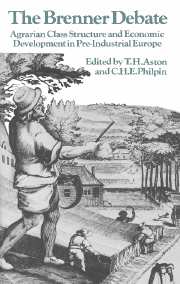Book contents
- Frontmatter
- Contents
- Preface
- Introduction
- 1 Agrarian Class Structure and Economic Development in Pre-Industrial Europe
- 2 Population and Class Relations in Feudal Society
- 3 Agrarian Class Structure and the Development of Capitalism: France and England Compared
- 4 Peasant Organization and Class Conflict in Eastern and Western Germany
- 5 A Reply to Robert Brenner
- 6 Against the Neo-Malthusian Orthodoxy
- 7 A Crisis of Feudalism
- 8 In Search of Agrarian Capitalism
- 9 Agrarian Class Structure and Economic Development in Pre-Industrial Bohemia
- 10 The Agrarian Roots of European Capitalism
- Index
- Past and Present Publications
4 - Peasant Organization and Class Conflict in Eastern and Western Germany
Published online by Cambridge University Press: 27 October 2009
- Frontmatter
- Contents
- Preface
- Introduction
- 1 Agrarian Class Structure and Economic Development in Pre-Industrial Europe
- 2 Population and Class Relations in Feudal Society
- 3 Agrarian Class Structure and the Development of Capitalism: France and England Compared
- 4 Peasant Organization and Class Conflict in Eastern and Western Germany
- 5 A Reply to Robert Brenner
- 6 Against the Neo-Malthusian Orthodoxy
- 7 A Crisis of Feudalism
- 8 In Search of Agrarian Capitalism
- 9 Agrarian Class Structure and Economic Development in Pre-Industrial Bohemia
- 10 The Agrarian Roots of European Capitalism
- Index
- Past and Present Publications
Summary
In his attempt to relate agrarian class structure and economic development in order to explain long-term economic development in pre-industrial Europe, Robert Brenner has made use of the German experience in several contexts. I, however, shall restrict myself here to discussing Brenner's thesis that the “divergent evolution of peasant class organization is clearest in what is probably the pivotal comparative case – east versus west Elbian Germany”.
Brenner gives only a brief sketch of peasant communities in western Germany, but goes on to depict their counterparts in east Elbia in greater detail to support his thesis that the failure of the east Elbian peasants to develop strong communal organization during the middle ages finally reduced them to serfdom in the early modern period. It is the lot of the comparative historian to have to rely on textbooks and secondary literature, but unfortunately Brenner has fallen victim to the Prussian myth (Hohenzollernlegende) with all its contradictions and inconsistencies. Though he obviously tried to avoid this pitfall by using some recent specialist studies, he has nevertheless reproduced the main weakness of the Hohenzollernlegende by projecting back to the middle ages the positive and negative aspects of more recent German history. Therefore, without going into too much detail, I wish, first, to examine the factual basis of Brenner's argument and, second, to discuss his concept of class structure in the light of the German experience.
Brenner maintains that the east Elbian peasant communities were comparatively weak because, as late colonial settlements dominated by landlords and their agents, they had no communal tradition.
- Type
- Chapter
- Information
- The Brenner DebateAgrarian Class Structure and Economic Development in Pre-industrial Europe, pp. 91 - 100Publisher: Cambridge University PressPrint publication year: 1985
- 4
- Cited by



